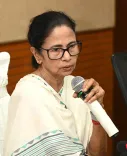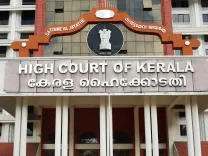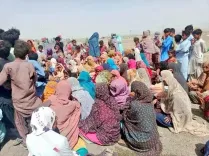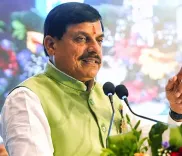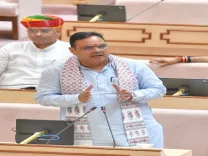Focus on Implementing a Unified System in the Agricultural Sector: Maharashtra Minister Manikrao Kokate (Interview with IANS)

Mumbai, Dec 31 (NationPress) The newly appointed Agriculture Minister of Maharashtra, Manikrao Kokate, has stated that the agricultural sector is encountering significant challenges and requires assistance through well-thought-out policy changes that will consider the perspectives of all involved parties.
In a special interview with IANS, Minister Kokate, elected from the Sinnar constituency on an NCP ticket, revealed plans to set up a high-level committee of experts to examine critical issues such as the widening gap between production costs and farmers' income, the escalating prices of pesticides and fertilizers, inadequate post-harvest infrastructure including processing units, cold storage facilities, and the necessity for higher guaranteed prices for agricultural products. He emphasized his commitment to enhancing transparency and simplifying processes by establishing a single window system in the agricultural sector.
Kokate remarked, "The contribution of agriculture to Maharashtra's GDP is relatively low due to several factors, including elevated production costs, the effects of climate change, and a decline in farmers' income as they often do not receive fair prices for their produce. The government needs to make informed policy decisions after comprehensive studies. Implementing a one-window system will be essential to ensure transparency and facilitate the smooth execution of various schemes aimed at the agricultural sector. This will follow my discussions with officials from the agriculture department and agricultural universities." He further noted, "A high-level committee of experts will be constituted soon, and the agriculture department will act based on its recommendations."
The Minister pointed out that there exists a disparity between the cost of production and processing, indicating that the government must increase efforts to set up more processing units. This is particularly pertinent for crops such as cotton and others. He questioned how to bring down production costs, for instance, reducing onion production costs from Rs 1,500 to Rs 700 per acre, thereby allowing onion farmers to save Rs 800 per acre. Additionally, the government will enhance initiatives to guarantee higher prices for crops.
He acknowledged that the soaring prices of pesticides and fertilizers pose a significant challenge for farmers, significantly inflating production costs. "The costs of pesticides and fertilizers have surged by 2 to 5 percent, adding extra pressure on farmers. Furthermore, the rise of counterfeit companies and suppliers has exacerbated their difficulties. The government will take stringent measures against this. I am aware that five bills have previously been introduced in the state legislature to address the supply of adulterated pesticides and fertilizers, particularly by fraudulent companies. I will discuss with the Chief Minister and Deputy Chief Ministers about reintroducing these bills in the legislature, as they require cabinet approval. Although this process may take time, I aim to expedite it," he said.
The Minister also noted that production costs are rising due to a significant increase in daily wages for agricultural laborers and the GST rates ranging from 5 percent to 18 percent on various agricultural inputs and equipment, which are matters that need to be addressed at the central level.
Kokate, hailing from the largest onion-producing region, Nashik district, stated that both the state and central governments must collaborate to support onion farmers who are often impacted by abrupt policy changes. "In onion farming, nearly 50 percent of decision-making power lies with the central government, which dictates policies regarding minimum export prices and import/export restrictions based on market prices. My goal is to develop a new policy to assist onion farmers through discussions with the central government, as it is not feasible to create a Maharashtra-specific policy without national consideration," he added.
Regarding the damage caused to agriculture from unseasonal rains in parts of Maharashtra in December, Kokate remarked, "I have collected information about the damage from district administrations and my department, as well as from the agriculture commissioner's office. Conversations with district collectors and agriculture department officials suggest that unseasonal rain can be beneficial for some crops while detrimental for others. The cracking of grapes in vineyards may not be immediately visible but will become apparent after a few days. A preliminary assessment has been submitted to the state government concerning the damage from unseasonal rains, and a detailed report will follow to enable the government to provide assistance to affected farmers."
On accusations of a crop insurance mafia in Beed district made by BJP legislator Suresh Dhas, the minister noted that Chief Minister Devendra Fadnavis has taken these allegations seriously and pledged to take appropriate action. "I am also aware of irregularities concerning the crop insurance schemes. However, I must clarify that issues in Parli (in Beed district) do not represent the entire state of Maharashtra. Dhas' claims relate to specific instances of irregularities in the farmers' insurance scheme, yet these allegations require investigation. Why haven’t other legislators reported similar issues from their constituencies? There are complaints about the crop insurance scheme in other districts, and these will also undergo thorough investigation. Corrective measures will be implemented to enhance the effectiveness of the crop insurance scheme across the state," he stated.
The Minister reaffirmed his strong support for transferring all benefits of government schemes directly to farmers via DBT, emphasizing that this process will be strengthened to prevent any irregularities or fraud.
Addressing the lack of collaboration between the agriculture department and the agriculture commissionerate, Kokate expressed his expectation for effective coordination to ensure prompt execution of government policies. "In cases of deficiencies, the government will take action against the responsible officers. I anticipate results-oriented performance from teams led by the agriculture secretary and the agriculture commissioner," he concluded.
(Sanjay Jog can be contacted at sanjay.j@ians.in)

